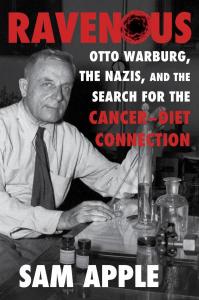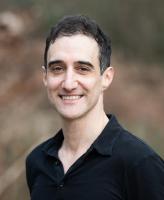
Sam Apple—Ravenous: Otto Warburg, the Nazis, and the Search for the Cancer-Diet Connection
AND THE SEARCH FOR THE CANCER-DIET CONNECTION
Sam Apple
Liveright, May 25, 2021, $28.95
ISBN-10:1631493159; ISBN-13:978-1631493157
Apple reports:
My book tells the story of the German biochemist Otto Warburg and how the revival of his long-lost research is changing our fundamental understanding of cancer. I had been interested in metabolism for a number of years but had not thought of cancer as a metabolic disease until I first learned of Warburg's research around eight years ago.
While I was fascinated by the science, I decided to write about the topic only when I learned of Warburg's extraordinary story of survival in Nazi Germany. Unlike almost all other scientists with Jewish heritage, Warburg remained in Germany throughout the war. The Nazis protected him because they thought he might cure cancer—a disease Hitler dreaded.
Warburg’s science was also interesting to me because I think it has important implications for our health and daily eating habits. Warburg discovered that cancer cells consume more glucose (blood sugar) than healthy cells and metabolize it differently. A number of prominent researchers who now study this unusual metabolism of cancer cells believe that it is driven, in part, by the sugar in our diets and sugar’s impact on the hormone insulin.I initially wrote an article about Otto Warburg for The New York Times Magazine. After publication of the article in May, 2016, Robert Weil, an editor at Liveright, contacted my agent, Dan Lazar, to ask if I would be interested in expanding the article into a book. I’ve been working with Dan since 2006.
I had never written a history before, and I wish I’d known more about archival research. It took me some time to learn how to navigate the various archives I visited.
I think aspiring nonfiction authors should consider writing a magazine feature on their topic as a first step. In addition to increasing the chances of selling a book proposal, the magazine feature requires an author to capture the core elements of the story. In my case, at least, the magazine article functioned much like an outline for the book.
Contact info:
- Sam Apple: samapple@gmail.com, http://www.samapple.com/, @sam_apple1
- Book: https://wwnorton.com/books/9781631493157
- Publicist: Cordelia Calvert, 212-354-5500, ccalvert@wwnorton.com
- Agent: Daniel Lazar, 212-685-2400, dlazar@writershouse.com
NASW members: will your book be published soon? Take advantage of this opportunity for shameless self-promotion. Submit your report for Advance Copy.
Tell your fellow NASW members how you came up with the idea for your book, developed a proposal, found an agent and publisher, funded and conducted research, and put the book together. Include what you wish you had known before you began working on your book, or had done differently.
See https://www.nasw.org/advance-copy-submission-guidelines.
View Advance Copy archives at https://www.nasw.org/member-article/advance-copy.
Thinking of writing a book? If you are a NASW member, you may access a list of more than 200 books and online resources to help you craft your book proposal, find an agent and funding sources, negotiate your contract, learn about self-publishing, publicize and market your book, and more at https://www.nasw.org/article/write-book.
Send book info and questions about book publishing to Lynne Lamberg, NASW book editor, llamberg@nasw.org.
Follow @LynneLamberg on Twitter for news about science/medical books and writing.
Hero image by Gerd Altmann from Pixabay
Advance Copy
The path from idea to book may take myriad routes. The Advance Copy column, started in 2000 by NASW volunteer book editor Lynne Lamberg, features NASW authors telling the stories behind their books. Authors are asked to report how they got their idea, honed it into a proposal, found an agent and a publisher, funded and conducted their research, and organized their writing process. They also are asked to share what they wish they’d known when they started or would do differently next time, and what advice they can offer aspiring authors. Lamberg edits the authors’ answers to produce the Advance Copy reports.
NASW members: Will your book be published soon? Visit www.nasw.org/advance-copy-submission-guidelines for information on submitting your report.
Publication of NASW author reports in Advance Copy does not constitute NASW's endorsement of any publication or the ideas, values, or material contained within or espoused by authors or their books. We hope this column stimulates productive discussions on important topics now and in the future as both science and societies progress. We welcome your discussion in the comments section below.





